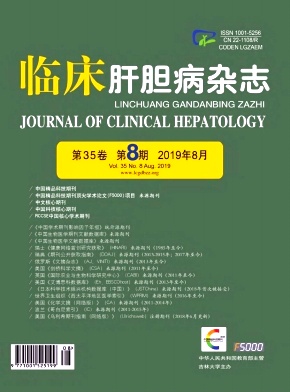|
[1] CHEN W, SUN K, ZHENG R, et al. Cancer incidence and mortality in China, 2014[J]. Chin Cancer Res, 2018, 30 (1) :1.
|
|
[2] TAN Y, JIANG J, WANG Q, et al. Radiofrequency ablation using a multiple-electrode switching system for hepatocellular carcinoma within the Milan criteria:Long-term results[J]. Int J Hyperthermia, 2018, 34 (3) :298-305.
|
|
[3] McGUIRE S. World Cancer Report 2014. Geneva, Switzerland:World Health Organization, International Agency for Research on Cancer, WHO Press, 2015[J]. Adv Nutr, 2016, 7 (2) :418-419.
|
|
[4] BRUIX J, LLOVET JM. Prognostic prediction and treatment strategy in hepatocellular carcinoma[J]. Hepatology, 2002, 35 (3) :519-524.
|
|
[5] YAMASHITA YI, TAKETOMI A, ITOH S, et al. Long term favorable results of limited hepatic resections for patients with hepatocellular carcinoma:20 years of experience[J]. J Am Coll Surgeons, 2007, 205 (1) :19-26.
|
|
[6] LLOVET JM, SCHWARTZ M, MAZZAFERRO V. Resection and liver transplantation for hepatocellular carcinoma[J]. Semin Liver Dis, 2005, 25 (2) :181-200.
|
|
[7] MADDALA YK, STADHEIM L, ANDREWS JC, et al. Drop-out rates of patients with hepatocellular cancer listed for liver transplantation:Outcome with chemoembolization[J]. Liver Transpl, 2004, 10 (3) :449-455.
|
|
[8] YAO FY, BASS NM, ASCHER NL, et al. Liver transplantation for hepatocellular carcinoma:Lessons from the first year under the Model of End-Stage Liver Disease (MELD) organ allocation policy[J]. Liver Transpl, 2004, 10 (5) :621-630.
|
|
[9] TSOULFAS G, KAWAI T, ELIAS N, et al. Long-term experience with liver transplantation for hepatocellular carcinoma[J]. J Gastroenterol, 2011, 46 (2) :249-256.
|
|
[10] RAHMAN A, ASSIFI MM, PEDROSO FE, et al. Is resection equivalent to transplantation for early cirrhotic patients with hepatocellular carcinoma? A meta-analysis[J]. J Gastrointest Sur, 2012, 16 (10) :1897-1909.
|
|
[11] MINAMI Y, KUDO M. Radiofrequency ablation of hepatocellular carcinoma:Current status[J]. World J Radiol, 2010, 2 (11) :417-424.
|
|
[12] LENCIONI R, CROCETTI L. Local-regional treatment of hepatocellular carcinoma[J]. Radiology, 2012, 262 (1) :43-58.
|
|
[13] GERMANI G, PLEGUEZUELO M, GURUSAMY K, et al. Clinical outcomes of radiofrequency ablation, percutaneous alcohol and acetic acid injection for hepatocelullar carcinoma:A meta-analysis[J]. J Hepatol, 2010, 52 (3) :380-388.
|
|
[14] HASEGAWA K, AOKI T, ISHIZAWA T, et al. Comparison of the therapeutic outcomes between surgical resection and percutaneous ablation for small hepatocellular carcinoma[J].Ann Surg Oncol, 2014, 21 (3) :348-355.
|
|
[15] CHOI D, LIM HK, RHIM H, et al. Percutaneous radiofrequency ablation for early-stage hepatocellular carcinoma as a first-line treatment:Long-term results and prognostic factors in a large single-institution series[J]. Eur Radiol, 2007, 17 (3) :684-692.
|
|
[16] SI TF, CHEN YJ, MA D, et al. Effect of preoperative transarterial chemoembolization on perioperative safety of patients with resectable hepatocellular carcinoma:A Meta-analysis[J].Chin J Dig Surg, 2017, 16 (5) :496-502. (in Chinese) 斯腾飞, 陈拥军, 马迪, 等.术前经导管动脉内化疗栓塞术对可切除性肝细胞癌围术期安全性影响的Meta分析[J].中华消化外科杂志, 2017, 16 (5) :496-502.
|
|
[17] YAMAGIWA K, SHIRAKI K, YAMAKADO K, et al. Survival rates according to the Cancer of the Liver Italian Program scores of 345 hepatocellular carcinoma patients after multimodality treatments during a 10-year period in a retrospective study[J]. J Gastroen Hepatol, 2008, 23 (3) :482-490.
|
|
[18] CUI YL. Targeted therapy for hepatocellular carcinoma[J].Chin J Dig Surg, 2018, 17 (5) :445-451. (in Chinese) 崔云龙.肝癌的靶向治疗[J].中华消化外科杂志, 2018, 17 (5) :445-451.
|
|
[19] ZHANG CY, ZHAO XX, LU ZM, et al. Research advances in sorafenib-induced apoptotic signaling pathways in liver cancer cells[J]. J Clin Hepatol, 2016, 32 (4) :816-820. (in Chinese) 张朝亚, 赵相轩, 卢再鸣, 等.索拉非尼诱导肝癌细胞凋亡信号通路的研究进展[J].临床肝胆病杂志, 2016, 32 (4) :816-820.
|
|
[20] LLOVET JM, RICCI S, MAZZAFERRO V, et al. Sorafenib in advanced hepatocellular carcinoma[J]. N Engl J Med, 2008, 359 (4) :378-390.
|
|
[21] FENG X, XU R, DU X, et al. Combination therapy with sorafenib and radiofrequency ablation for BCLC Stage 0-B1hepatocellular carcinoma:A multicenter retrospective cohort study[J]. Am J Gastroenterol, 2014, 109 (12) :1891-1899.
|
|
[22] KUDO M, UESHIMA K, TORIMURA T, et al. Randomized, open label, multicenter, phase II trial of transcatheter arterial chemoembolization (TACE) therapy in combination with sorafenib as compared with TACE alone in patients with hepatocellular carcinoma:TACTICS trial[J]. J Clin Oncol, 2018, 36 (15 Suppl) :4017.
|
|
[23] BRUIX J, QIN S, MERLE P, et al. Regorafenib for patients with hepatocellular carcinoma who progressed on sorafenib treatment (RESORCE) :A randomised, double-blind, placebo-controlled, phase 3 trial[J]. Lancet, 2017, 389 (10064) :56-66.
|
|
[24] REN ZG. Immunotherapy for hepatocellular carcinoma[J]. J Clin Hepatol, 2018, 34 (7) :1371-1373. (in Chinese) 任正刚.肝细胞癌的免疫治疗[J].临床肝胆病杂志, 2018, 34 (7) :1371-1373.
|
|
[25] SANMAMED MF, CHEN L. A paradigm shift in cancer immunotherapy:From enhancement to normalization[J]. Cell, 2019, 176 (3) :677.
|
|
[26] EL-KHOUEIRY AB, SANGRO B, YAU T, et al. Nivolumab in patients with advanced hepatocellular carcinoma (CheckMate040) :An open-label, non-comparative, phase 1/2 dose escalation and expansion trial[J]. Lancet, 2017, 389 (10088) :2492-2502.
|









 本站查看
本站查看




 DownLoad:
DownLoad: